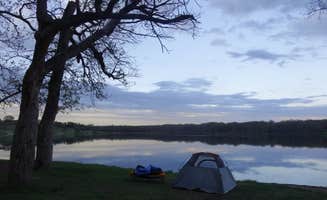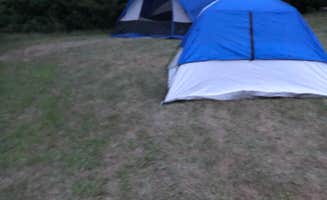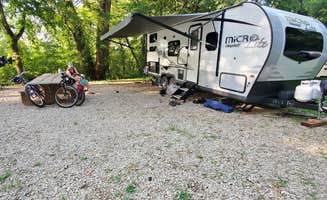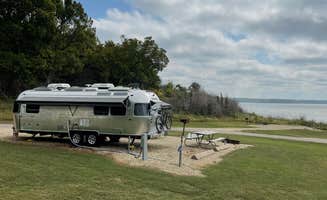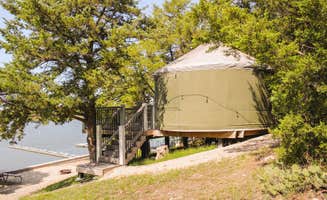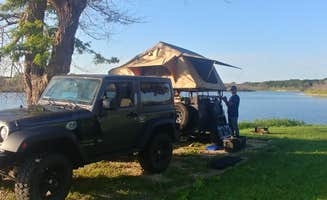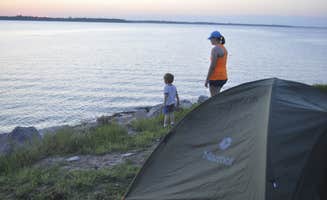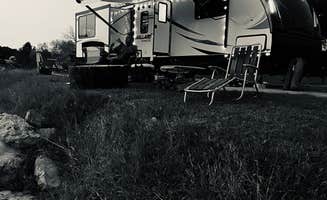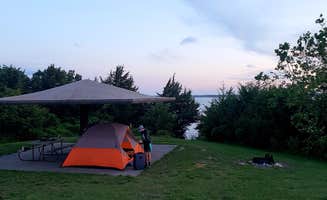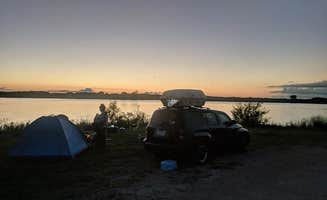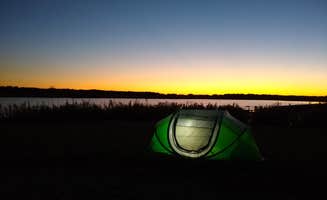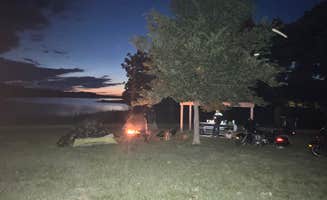Camping sites near Westmoreland, Kansas offer diverse options within the rolling Flint Hills ecosystem. The area sits at approximately 1,300 feet elevation with moderately hot summers reaching 90°F and cold winters that can drop below 20°F. Weather conditions vary seasonally with spring and fall providing the most comfortable temperatures for outdoor recreation, though seasonal storms can affect camping access.
What to do
Kayaking and canoeing: Tuttle Creek Cove provides excellent water recreation opportunities with rentable equipment. "We rented kayaks and canoes for a leisurely paddle around the lake. Our camp site had plenty of over head cover from the sun," notes a visitor at Tuttle Creek Cove.
Wildlife observation: Early mornings provide excellent animal sightings at Pottawatomie County State Lake #2. "Was the only one camping but had some beaver neighbors catching fish all night... Wildlife heard all around," reports one camper who enjoyed the natural setting at Pottawatomie County State Lake #2.
Fishing: Multiple campgrounds feature shoreline fishing access with varying fish populations. "Great for kayaking. Couple geocaches as well. I live near by and have gone every month of the year," shares a local who frequents Pottawatomie County State Lake #2.
Trail exploration: Several campgrounds maintain walking and hiking paths near water features. "The hiking trails are well maintained. Great Lake for fishing and boating," mentions a visitor at Rocky Ford Campground.
What campers like
Spacious campsites: Many campgrounds provide well-designed sites with good separation between neighbors. "This is what campgrounds should be! Plenty of space, amazing prices, lots of trees with well kept grass and scenic water views," shares a camper at Riley Point Campground.
Convenient highway access: Several camping areas offer relatively quick access from major highways. "Such a beautiful campground just a short drive (15 min) off the 70. Stopped for one night driving across the country wished we had more time," reports a traveler who stayed at Tuttle Creek Cove.
Seasonal wildlife viewing: Different seasons bring varied wildlife viewing opportunities. "We saw a beautiful owl that flew between the trees," mentions a visitor at Randolph — Tuttle Creek State Park, who also noted: "My husband and I stayed in a site with beautiful trees and sunflowers growing all around us. The monarchs must have been migrating because they were all over the trees."
Overnight convenience: Many campers use the area as a convenient stopover when traveling through Kansas. "Making a trip out west needed an easy stop for a night of sleep. Close enough off the highway, close enough to shopping. Easy to pull in and find a spot," notes a camper at Pottawatomie County State Lake #2.
What you should know
Seasonal bathroom conditions: Facilities at some campgrounds receive mixed reviews regarding cleanliness. "Bathrooms and showers are disgusting. Campsites are good size, even though there are a million of them," warns a camper at Riley Point Campground.
Weekday vs. weekend occupancy: Campground usage varies significantly throughout the week. "We arrived at around 5 on a Sunday and had a hard time finding a spot by by around 6pm all the locals were leaving and we ended up being the only people there by sunset," shares a visitor at Pottawatomie County State Lake #2.
Limited trash facilities: Some camping areas have reduced or eliminated trash collection. "Nice spots near the water. Lots of fishers during the day but cleared out at night. No longer picking up trash," reports a recent camper at Pottawatomie County State Lake #2.
Insect preparedness: Certain times of year require extra protection from insects. "Bring bug spray, as the mosquitoes and chiggers were biting!" warns a visitor at Randolph — Tuttle Creek State Park.
Tips for camping with families
Community parks with camping: Local parks provide amenities for family outings. "Beautiful park right off Highway 16 in Olsburg, KS. Lots of shade provided by big trees and a lovely picnic shelter - complete with a prep area and double charcoal grill," shares a visitor at Greenwood Park.
Swimming options: Several locations offer swimming opportunities during summer. "There is a nice beach area to swim," notes a July 4th visitor at Tuttle Creek Cove who enjoyed family water recreation.
Kid-friendly wildlife: Seasonal animal activity provides educational opportunities. "We stopped at this camping spot on our way from Georgia to Colorado. This was one of our favorite spots because it wasn't overly populated. Also the wild life was great," explains a family at Pottawatomie County State Lake #2.
Tips from RVers
Site leveling considerations: Some RV sites require additional preparation for comfort. "Pull throughs are not too level and services are on the wrong side so make sure your hose and electric cable are long enough," advises an RVer at River Pond State Park Campground.
Navigation challenges: Large campgrounds can be difficult to navigate, especially after dark. "Park does need to label the roads with site numbers. I recommend arriving in daylight to find your spot, as well as researching your location beforehand," suggests an RVer at River Pond State Park Campground.
Full hookup availability: Limited full service sites require advance planning. "This park is close to home for us and we camp here often. Most sites are only water and electric. There are only a half dozen or so full hook up sites and they are generally always full during camping season," explains a regular camper at River Pond State Park Campground.


